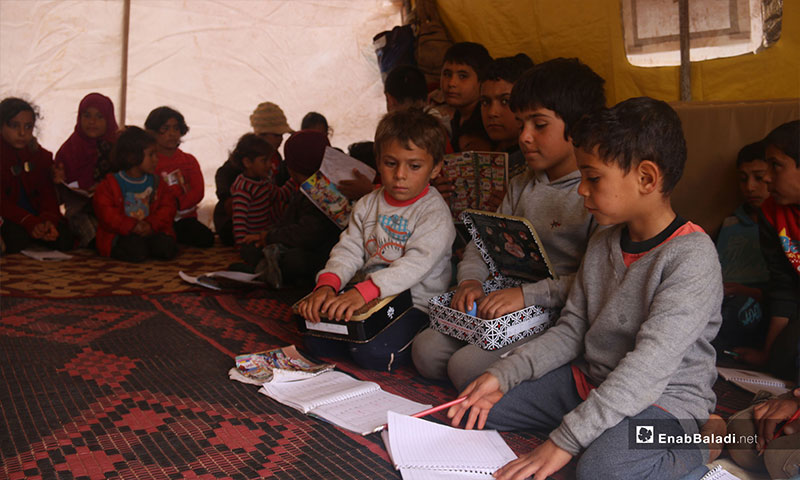



“We cannot afford to buy books for the pupils or pay salaries to teachers, and we do not even have the most basic education supplies. Nevertheless, children here are our children and we have to educate them and stand with them to build a better future for them,” Mr. Rasheed explains the difficulties he and his colleagues face at the beginning of each new school year.
In the western Idlib countryside camps, starting from the village of al-Hambushiyah to the village of Foz – Zuf, approximately 8,000 children are starting the new school year. They are distributed over 40 schools with an average level of education, as described by the Director of Latakia Education Directorate, Mr. Mohammad Fares Hamadi, in an interview with Enab Baladi. In contrast, some parents consider the education reality to be very low and of bad quality.
Mr. Rasheed, the principal of al-Wafa School in al-Wafa camp in western Idlib countryside, said that the number of those who have registered in the school for the next school year (2019-2020) reached 163 pupils, living in the camps of al-Wafa, Khermash and random camps in the area. Mr. Rasheed pointed out in an interview with Enab Baladi that his school staff has been working voluntarily since the establishment of the school three years ago, except for the last school year, as the teaching staff received one grant, worth ten thousand Syrian liras per teacher, equivalent to approximately $ 16.
However, the major problem facing schools operating in the western Idlib countryside camps, according to the principal of al-Wafa School, is the lack of accredited curricula and books for students, especially the first and second-grade books, of which no copy has reached the camps, as he put it.
Mr. Rasheed added that education is necessary, especially amid the circumstances that the country is going through. “We cannot stop teaching and neglect a whole generation, but under the circumstances we are going through, it has become very difficult,” he said, stressing that the schools will open in the next week and his school could not afford to buy blackboard markers, printing papers, ink and other essential supplies.
Near al-Wafa School, just 10 kilometers away, a remote school is located in a camp on the Syrian-Turkish borders. “We receive a monthly salary of $ 150 from an educational organization. Every year, we sign one-year renewable contracts, under which the organization provides salaries and all school supplies,” said a teacher in this remote school.
The teacher, speaking on condition of anonymity, explained that in case of the suspension of the support, it would be difficult for the teachers to stop their work. He added: “But we also have families who need a lot of requirements. Therefore, organizations working in northern Syria must provide salaries for teachers to be able to complete their work without thinking and worrying about their families.”
The teacher explained that some schools were able to sign new contracts with some organizations and secured support for their staff, but others failed to achieve this. He considered this situation to be “unfair”, calling the Head of the Education Department at Free Latakia, to which the schools in the camps of western Idlib countryside belong, to provide support and salaries to all teachers.
Both the Director of al-Sahel high school, in Ataa al-Khair camp in Idlib western countryside, Marii Shahida and the Head of Free Latakia Directorate of Education, to which the school belongs, Mohammad Fares Hammadi, had an argument before the beginning of the current academic year.
This argument lasted for weeks and was brought before the courts and monitoring committees. Finally, a decision has been issued exempting Marii Shahida from running “al-Sahel” high school.
Shahida told Enab Baladi that the high school, which was established three years ago, aims to offer students the opportunity to pursue their studies, pointing out that some of the secondary level students who previously studied there are now in universities studying in various disciplines.
“I built the high school using my own money and agreed with the landowner that the school building will be his after five years, but I was surprised when the Education Directorate decided to stop me from running the secondary school. I didn’t expect the dispute to reach such an end,” said Shahida, accusing some figures of deliberately wavering him for personal reasons.
On the other hand, the Director of Free Latakia Education Directorate, Mohammad Fares Hammadi, told Enab Baladi that at the end of the last academic year, the Directorate notified the Director of al-Sahel high school and its administrative staff several times due to some administrative errors. They lost some of the students’ records which were not sent to the Ministry of Education of the “Syrian Interim Government” so that it could register the students for secondary school and preparatory exams.
He said that some problems were related to the lack of a timetable for students, which compelled them to carry all their books every day to school amid the absence of organization.
“At first we tried to fix mistakes and talk with Mr. Marii, but he did not respond and filled a complaint against us more than once. At the end, the Ministry of Education sent a committee to look into the dispute and ended up acknowledging his administrative errors and decided to dismiss him from the school administration.”
Despite conflicts, disagreements, and the lack of support, educational staff and students remain the victims of the circumstances surrounding them. Providing a good salary for teachers and a recognized certificate for students remains a top priority though.
if you think the article contain wrong information or you have additional details Send Correction